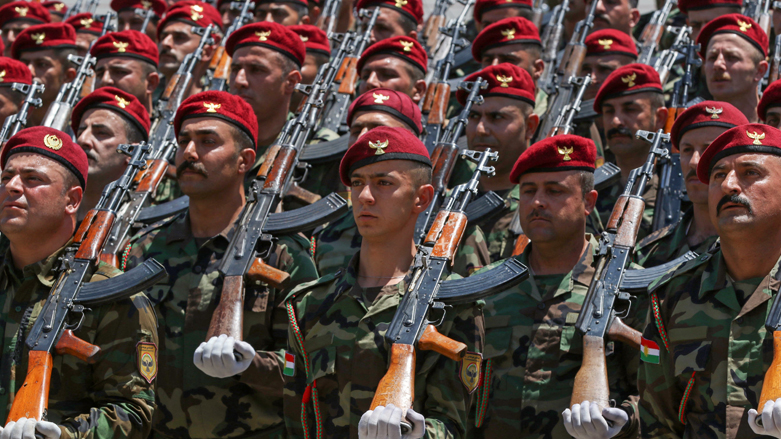Anti-ISIS Coalition hails Progress in Peshmerga Reform
"A key milestone for Peshmerga reform and a significant demonstration of the commitment of our partners to the long-term security and stability of the region," McFarlane said.

WASHINGTON DC, United States (Kurdistan 24) – The Commander of the anti-ISIS Coalition, Maj. Gen. Matthew McFarlane, speaking to journalists earlier this week, highly praised recent reform within the Peshmerga forces: the creation of two infantry divisions, belonging to neither of the two major Kurdish parties, but falling under the authority of the Kurdistan Regional Government’s (KRG) Ministry of Peshmerga Affairs.
The origin of the push for such reforms stems from the fight against ISIS, when it invaded Iraq in June 2014. The onslaught precipitated the collapse of the Iraqi Army, which, in the course of its sudden defeat, surrendered its equipment to ISIS, making the terrorist organization even stronger.
In the Kurdistan Region, however, the Peshmerga were able to hold the line against ISIS, with the support of the US-led coalition. Early on, it became apparent that one of the deficiencies was the lack of a unified command structure.
Already by August, the President of the Kurdistan Region, Masoud Barzani, recognized the problem. He directed the Peshmerga Ministry to address it and place the Kurdish forces under a single, unified command.
This was a serious matter. The fight was not easy. Some2,000 Peshmerga died in combat against ISIS, while another 12,000 were wounded.
In fact, it was not until after the defeat of ISIS, as proclaimed by former Iraqi Prime Minister, Haider al-Abadi in late 2017, that permanent and institutionalized Peshmerga reform emerged as a central issue.
Among other things, it became a key plan in Prime Minister Masrour Barzani’s reform program. The anti-ISIS Coalition actively promoted the change as well.
Read More: Senior Peshmerga commanders support new KRG reform efforts
Anti-ISIS Coalition Hails Peshmerga Reform
Maj. Gen. McFarlane, speaking to journalists on Monday, cited the progress that the Coalition has made in the fight against ISIS, as attacks from the terrorist group in Iraq and Syria are significantly less this year than they were a year ago.
Read More: Decrease in IS attacks in Iraq, Syria: coalition
Similarly, McFarlane hailed advances in the development of the Coalition’s regional partners. “We’ve also seen progress,” he said, “as partners build the required capacity and capability to sustain the enduring defeat” of ISIS.
“In the Iraqi Kurdistan Region, the Kurdistan Regional Government established the first two Peshmerga divisions in Kurdistan in early April,” McFarlane continued, describing it as “a key milestone for Peshmerga reform and a significant demonstration of the commitment of our partners to the long-term security and stability of the region.”
Read More: Two new infantry divisions formed, including unified units within Peshmerga Ministry
McFarlane also discussed the capabilities of local forces, as he responded to a question from Kurdistan 24’s Wladimir van Wilgenburg, the first question McFarlane answered.
Van Wilgenburg asked about the capabilities of local forces fighting ISIS in Iraq and Syria, and McFarlane responded, “I continue to be impressed with the competence and capabilities that our partners continue to demonstrate, specifically with the ISF [Iraqi Security Forces, which include the Peshmerga] and the SDF [Kurdish-led Syrian Democratic Forces] conducting wide-area security operations,” as they continue to keep the pressure on ISIS and “prevent [it] from re-establishing any type of network or effective military effort.”
Van Wilgenburg’s question included a request for an assessment of whether the local partner forces still required support for aspects of their activities or whether they were “capable of conducting operations independently.”
In response, McFarlane emphasized that Coalition forces were not involved in combat, but had an “advise, assist, and enable” mission.
“We continue to focus on those areas of which the ISF requests our support,” which includes “things like ISR [Intelligence, Surveillance, and Reconnaissance],” McFarlane added.
He also explained that the Coalition provided advice in planning and executing operations, most particularly combined arms operations. “We remain committed and will continue to provide any type of enabling or advisory support needed to deliver on this mission and see it completed,” he concluded.